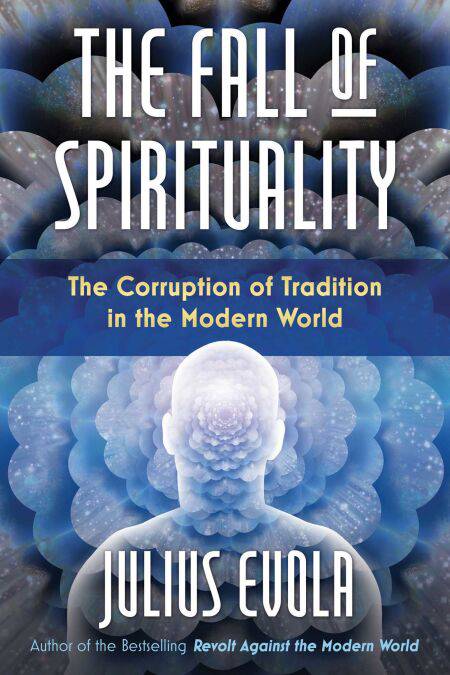
En raison d'une grêve chez bpost, votre commande pourrait être retardée. Vous avez besoin d’un livre rapidement ? Nos magasins vous accueillent à bras ouverts !
- Retrait gratuit dans votre magasin Club
- 7.000.000 titres dans notre catalogue
- Payer en toute sécurité
- Toujours un magasin près de chez vous
En raison de la grêve chez bpost, votre commande pourrait être retardée. Vous avez besoin d’un livre rapidement ? Nos magasins vous accueillent à bras ouverts !
- Retrait gratuit dans votre magasin Club
- 7.000.0000 titres dans notre catalogue
- Payer en toute sécurité
- Toujours un magasin près de chez vous
The Fall of Spirituality EBOOK
The Corruption of Tradition in the Modern World
Julius Evola
Ebook | Anglais
25,71 €
+ 25 points
Description
• Examines newer spiritual “systems” of the modern era, from spiritism and theosophy, to parapsychic research and anthroposophism, to psychoanalysis and the Church of Satan
• Compares these newer spiritual “systems” to the traditional spiritual path of the ancients and exposes the misunderstandings, misinterpretations, and occult dangers lurking in their practices
• Also examines important modern figures such as Nietzsche, Aleister Crowley, Rudolf Steiner, Dostoevsky, Freud, Jung, Gurdjieff, Krishnamurti, and Anton LaVey
Written two years before his most prominent book Revolt Against the Modern World, Julius Evola’s The Fall of Spirituality was originally published in Italian as Maschera e volto dello spiritualismo contemporaneo (The Mask and Face of Contemporary Spiritualism). In it, the Baron critiques the spiritual schools, cults, philosophies, and mystical teachers of the 20th century--from spiritism and theosophy, to parapsychic research and anthroposophism, to psychoanalysis and the Church of Satan--comparing these newer spiritual “systems” to the traditional spiritual path of the ancients and exposing the misunderstandings, misinterpretations, and occult dangers lurking in their practices.
Examining important modern figures such as Nietzsche, Aleister Crowley, Rudolf Steiner, Dostoevsky, Freud, Jung, Gurdjieff, Krishnamurti, and Anton LaVey, the author contends that their aspirations to power are limited to a focus on concerns of the mundane world. They are thereby blind to the existence of a supernatural reality that offers individuals transmutation from the fallen human personality into a semigod-like status--a status attainable only by those who can master the rigors demanded of initiates on the traditionalist path.
Offering an essential guidebook for serious spiritual seekers looking for a more profound metaphysical discipline than those of the spiritual schools of the modern era, Evola also provides contrasting insights from the age-old path of initiation and high magic.
• Compares these newer spiritual “systems” to the traditional spiritual path of the ancients and exposes the misunderstandings, misinterpretations, and occult dangers lurking in their practices
• Also examines important modern figures such as Nietzsche, Aleister Crowley, Rudolf Steiner, Dostoevsky, Freud, Jung, Gurdjieff, Krishnamurti, and Anton LaVey
Written two years before his most prominent book Revolt Against the Modern World, Julius Evola’s The Fall of Spirituality was originally published in Italian as Maschera e volto dello spiritualismo contemporaneo (The Mask and Face of Contemporary Spiritualism). In it, the Baron critiques the spiritual schools, cults, philosophies, and mystical teachers of the 20th century--from spiritism and theosophy, to parapsychic research and anthroposophism, to psychoanalysis and the Church of Satan--comparing these newer spiritual “systems” to the traditional spiritual path of the ancients and exposing the misunderstandings, misinterpretations, and occult dangers lurking in their practices.
Examining important modern figures such as Nietzsche, Aleister Crowley, Rudolf Steiner, Dostoevsky, Freud, Jung, Gurdjieff, Krishnamurti, and Anton LaVey, the author contends that their aspirations to power are limited to a focus on concerns of the mundane world. They are thereby blind to the existence of a supernatural reality that offers individuals transmutation from the fallen human personality into a semigod-like status--a status attainable only by those who can master the rigors demanded of initiates on the traditionalist path.
Offering an essential guidebook for serious spiritual seekers looking for a more profound metaphysical discipline than those of the spiritual schools of the modern era, Evola also provides contrasting insights from the age-old path of initiation and high magic.
Spécifications
Parties prenantes
- Auteur(s) :
- Editeur:
Contenu
- Nombre de pages :
- 240
- Langue:
- Anglais
Caractéristiques
- EAN:
- 9781620559789
- Date de parution :
- 29-03-21
- Format:
- Ebook
- Protection digitale:
- Adobe DRM
- Format numérique:
- ePub

Les avis
Nous publions uniquement les avis qui respectent les conditions requises. Consultez nos conditions pour les avis.






